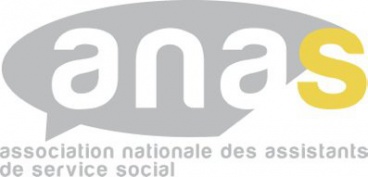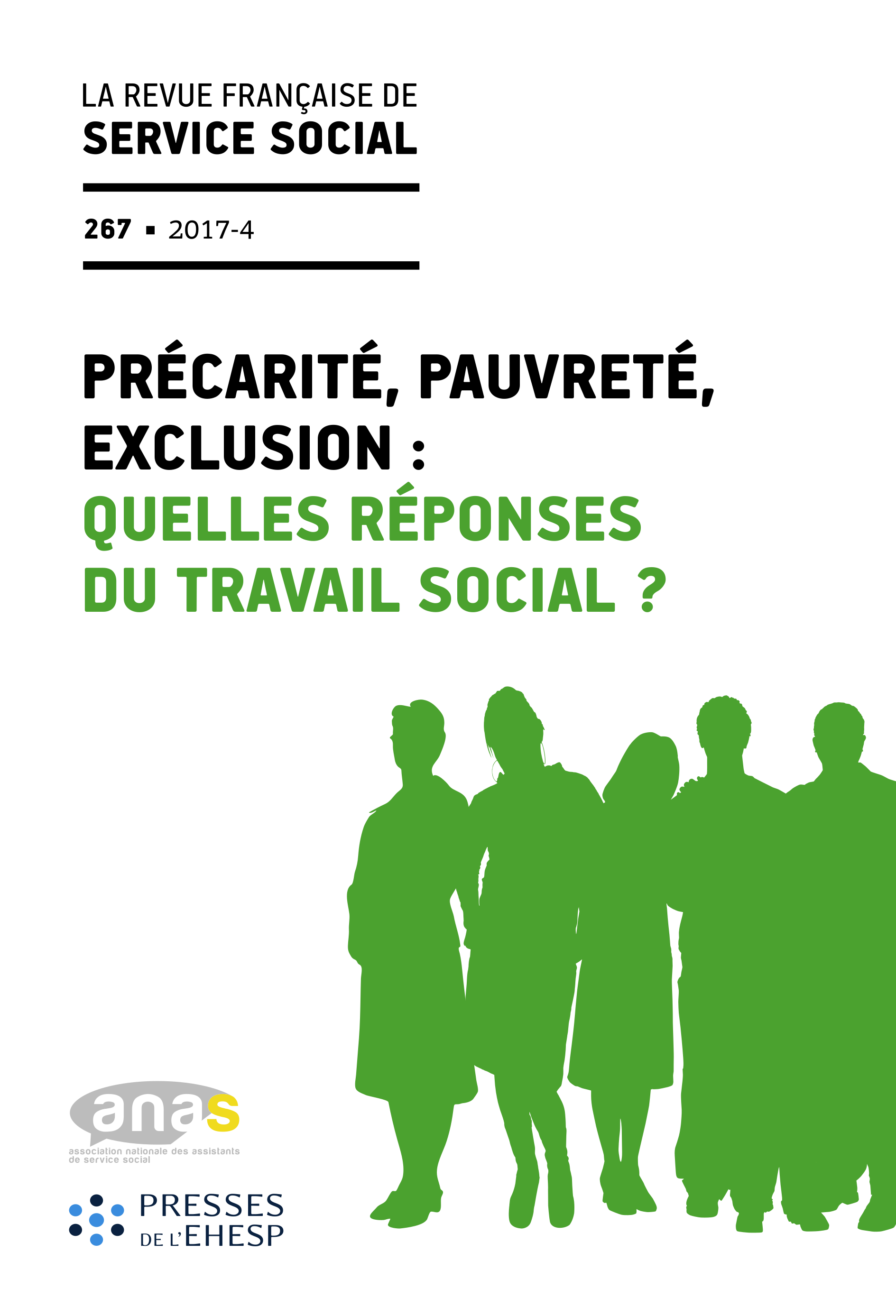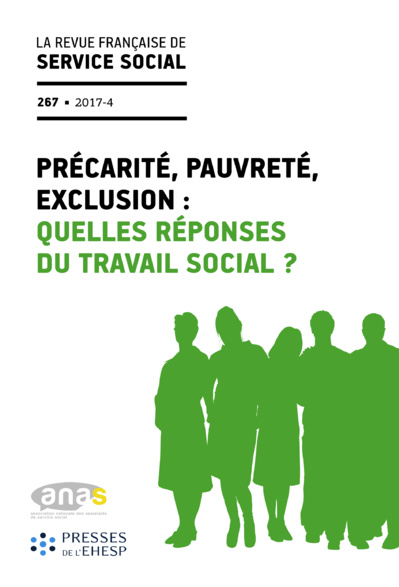Présentation du sommaire du numéro 267 de la revue, de l’éditorial de Michelle Gagnadoux ainsi qu’un article intitulé « Au défi de l’ingénierie sociale. L’avènement historique d’une pratique éthique 'éprouvée' » rédigé par Denis Fleurdorge.
Le numéro peut bien sûr être commandé dans notre espace boutique !
Le numéro peut bien sûr être commandé dans notre espace boutique !
Autres articles
-
 RFSS N°299 : « 80 ans ! ANAS Hier, aujourd'hui, demain »
RFSS N°299 : « 80 ans ! ANAS Hier, aujourd'hui, demain »
-
 RFSS N°298 : « Service social et précarité alimentaire »
RFSS N°298 : « Service social et précarité alimentaire »
-
 RFSS N°297 : « Service social et féminisme : héritages, pratiques et résistances »
RFSS N°297 : « Service social et féminisme : héritages, pratiques et résistances »
-
 RFSS N°296 : « Service social et santé : innover et accompagner pour un avenir durable »
RFSS N°296 : « Service social et santé : innover et accompagner pour un avenir durable »
-
 RFSS N°295 : « Le service social en action : prévenir et soutenir la santé »
RFSS N°295 : « Le service social en action : prévenir et soutenir la santé »
PRÉCARITÉ, PAUVRETÉ, EXCLUSION : QUELLES RÉPONSES DU TRAVAIL SOCIAL ?
- Éditorial
Michelle Gagnadoux
- Conflits de générations dans le travail social : oubli du métier ou nouvelles formes d’engagement ?
Nicolas Duvoux, Pauline Mutuel
- Vivre ensemble quand le social souffre. Minima sociaux de l’insertion, quelles figures ?
Nathalie Page
- Face au défi de la pauvreté : savoir investir dans la richesse des plus pauvres. Une pauvreté inscrite durablement dans la société
Christian Chassériaud
- Au défi de l’ingénierie sociale. L’avènement historique d’une pratique éthique « éprouvée »
Denis Fleurdorge
- L’Union européenne face à la pauvreté : politique sociale et travail social dans un même but ?
Marie-Geneviève Mounier
- Lutte contre la pauvreté : prétexte à refonder le travail social ?
Didier Bertrand
- Incidences de la nouvelle convention UNEDIC sur la précarité des demandeurs d’emploi
Nathalie Boudhabhay
- Hyperincarcération : une politique de lutte contre la pauvreté ?
Agathe Legros
- Une halte étape
Lucie Martine
- Une pratique
Pauline Willms
- Une pratique inspirante
Marie-Henriette Etcheverry
- Célébrons les 100 ans du premier livre de méthodologie en travail social ! L’héritage de Mary E. Richmond
Lilian Gravière
- Nous avons reçu
- Nous avons lu
- Éditorial
Michelle Gagnadoux
- PREMIÈRE PARTIE : QUAND LA RÉALITÉ SOCIALE QUESTIONNE L’IDENTITÉ DES PROFESSIONNELS ET INTERROGE LES PRATIQUES EN TERMES D’ÉTHIQUE
Nicolas Duvoux, Pauline Mutuel
- Vivre ensemble quand le social souffre. Minima sociaux de l’insertion, quelles figures ?
Nathalie Page
- Face au défi de la pauvreté : savoir investir dans la richesse des plus pauvres. Une pauvreté inscrite durablement dans la société
Christian Chassériaud
- Au défi de l’ingénierie sociale. L’avènement historique d’une pratique éthique « éprouvée »
Denis Fleurdorge
- DEUXIÈME PARTIE : LE TRAVAIL SOCIAL FACE À LA PAUVRETÉ EN EUROPE ET EN FRANCE
Marie-Geneviève Mounier
- Lutte contre la pauvreté : prétexte à refonder le travail social ?
Didier Bertrand
- Incidences de la nouvelle convention UNEDIC sur la précarité des demandeurs d’emploi
Nathalie Boudhabhay
- TROISIÈME PARTIE : DE LA RÉALITÉ AUX PRATIQUES, DONNER DU SENS À L’ACCOMPAGNEMENT
Agathe Legros
- Une halte étape
Lucie Martine
- Une pratique
Pauline Willms
- Une pratique inspirante
Marie-Henriette Etcheverry
- COMMUNICATIONS
Lilian Gravière
- VIE DE L’ANAS
- Nous avons lu
Abstract
FRENCH REVIEW OF SOCIAL SERVICE N ° 267
2017- 4
PRECARITY, POVERTY, EXCLUSION: WHAT SOCIAL WORK REPONSES ?
Editorial
Michelle Gagnadoux
In one of the richest countries in the world, millions of people live in "poverty". According to the latest figures the INSEE (2016) 14.3% of the French population is poor, so 8.6 million people. How to measure poverty and precariousness? Who are the poor in France? What means to be poor? There is no consensual definition, so it is a difficult concept to grasp. Each individual has his own perception of poverty. We can say that it is a multidimensional phenomenon.
Some very approximative wayto evaluate poverty is connected with the median income. To be poor is to be a victim of material deprivation, poverty propels people into a situation of rupture, until exclusion. Poverty is an attack on the fundamental citizen rights
We can talk about several forms of poverty, economic poverty that leads to a form of dependence on social services, poverty linked to the immigration of people, families in an irregular situation who call for help by soliciting charities. New forms of poverty affect all ages, from young to old ... and involve social poverty in terms of human dignity.
According to the Observatoire des Inequalities, half of the poor are under 30 years (they represent 36% of the five million poor people). For the past 20 years, Father Wresinski's report has been referenced in 1988. Although the welfare state is over, public authorities, through solidarity-oriented social policies, have tried to remedy this situation. by an accumulation of devices.
Yet the social divide is more and more pronounced, social inequalities of access to care, housing, education, culture ... always more victims. Although it is difficult to measure the non-use of benefits, would it be a sign of a fault in the social protection system? Now we can work and be poor. Daily news reminds us!
Did the multiannual plan against poverty (2013/2016) designed as a social shield, to protect people in difficulty, and to be a social springboard, meet these objectives? How can social workers give meaning to their interventions in this context?
In 2016, the "commitment" with the program "France is committing" was the great national cause. New forms of action are to be imagined to reinvent public policies. Our society is undoubtedly able to produce forms of support and social innovation. The current political debate speaks of "universal income. First part of this issue questions and observes poverty by a conceptual approach, the place of social work through professional commitment, with a generational approach to based on ethics practices, and the state response in terms of assistance.State tries to answer by social policies any way limited. Will social work create new forms of solidarity, different actors of the solidarity think of orientations. The sociology approaches the society by strata , about the social link and promotes the implication of the concerned people
The second part deals with new perspectives Indeed the European Union, is mobilized and proposes orientations. How the UNEDIC convention stakes can answer to precarious job seekers ? In order to face these real social inequalities,how social workers can revisit their practices through the permanent respect for the person, get the power to choose and act?
The third part shows how professionals from their experiences, in prison, in polyvalent social service ... lead ethical reflections on this societal topic.
2017- 4
PRECARITY, POVERTY, EXCLUSION: WHAT SOCIAL WORK REPONSES ?
Editorial
Michelle Gagnadoux
In one of the richest countries in the world, millions of people live in "poverty". According to the latest figures the INSEE (2016) 14.3% of the French population is poor, so 8.6 million people. How to measure poverty and precariousness? Who are the poor in France? What means to be poor? There is no consensual definition, so it is a difficult concept to grasp. Each individual has his own perception of poverty. We can say that it is a multidimensional phenomenon.
Some very approximative wayto evaluate poverty is connected with the median income. To be poor is to be a victim of material deprivation, poverty propels people into a situation of rupture, until exclusion. Poverty is an attack on the fundamental citizen rights
We can talk about several forms of poverty, economic poverty that leads to a form of dependence on social services, poverty linked to the immigration of people, families in an irregular situation who call for help by soliciting charities. New forms of poverty affect all ages, from young to old ... and involve social poverty in terms of human dignity.
According to the Observatoire des Inequalities, half of the poor are under 30 years (they represent 36% of the five million poor people). For the past 20 years, Father Wresinski's report has been referenced in 1988. Although the welfare state is over, public authorities, through solidarity-oriented social policies, have tried to remedy this situation. by an accumulation of devices.
Yet the social divide is more and more pronounced, social inequalities of access to care, housing, education, culture ... always more victims. Although it is difficult to measure the non-use of benefits, would it be a sign of a fault in the social protection system? Now we can work and be poor. Daily news reminds us!
Did the multiannual plan against poverty (2013/2016) designed as a social shield, to protect people in difficulty, and to be a social springboard, meet these objectives? How can social workers give meaning to their interventions in this context?
In 2016, the "commitment" with the program "France is committing" was the great national cause. New forms of action are to be imagined to reinvent public policies. Our society is undoubtedly able to produce forms of support and social innovation. The current political debate speaks of "universal income. First part of this issue questions and observes poverty by a conceptual approach, the place of social work through professional commitment, with a generational approach to based on ethics practices, and the state response in terms of assistance.State tries to answer by social policies any way limited. Will social work create new forms of solidarity, different actors of the solidarity think of orientations. The sociology approaches the society by strata , about the social link and promotes the implication of the concerned people
The second part deals with new perspectives Indeed the European Union, is mobilized and proposes orientations. How the UNEDIC convention stakes can answer to precarious job seekers ? In order to face these real social inequalities,how social workers can revisit their practices through the permanent respect for the person, get the power to choose and act?
The third part shows how professionals from their experiences, in prison, in polyvalent social service ... lead ethical reflections on this societal topic.



